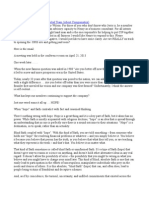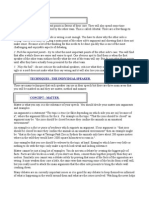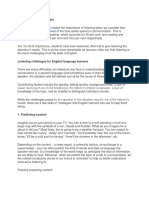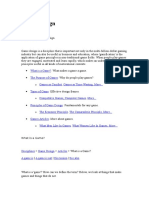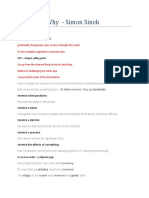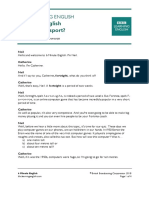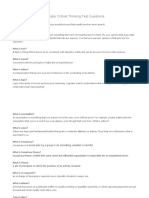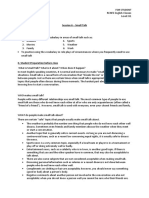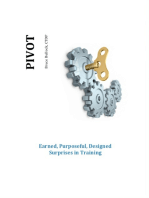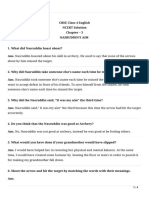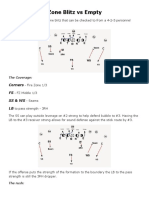Professional Documents
Culture Documents
BEP057SN-Sports Idioms1
BEP057SN-Sports Idioms1
Uploaded by
fernandobh2017Original Title
Copyright
Available Formats
Share this document
Did you find this document useful?
Is this content inappropriate?
Report this DocumentCopyright:
Available Formats
BEP057SN-Sports Idioms1
BEP057SN-Sports Idioms1
Uploaded by
fernandobh2017Copyright:
Available Formats
businessenglishpod.
com
The Business English podcast for professionals on the move
BEP 57 – Water Cooler Chitchat: Sports Idioms 1
Clayton: Welcome to today’s show, the first in an ongoing series where we listen in
on some typical chitchat around the office water cooler. You’ll find a water cooler in
offices around the world – usually in the break room where employees gather to
drink a cup of coffee or tea and take a rest from work.
And during these breaks, you might meet with a colleague and exchange words
about life, your jobs, your company, sports, politics or whatever. So “Water cooler
Chichat” has come to refer to all types of informal communication that take place at
the office.
Peter: Okay, so a water cooler is just a machine that stores and gives out water
right?
Clayton: Hmm Huh.
Pete: And can you explain
“chitchat” for us?
Clayton: Chitchat just means
light informal conversation –
small talk. Sometimes it
includes “gossip” – rumors or
private information, true or
untrue – about other people or
companies.
Peter: So this series will be
focusing on informal
communication?
Clayton: Yeah, that’s right, in our Water Cooler Chitchats, we’ll explore various
aspects of informal communication, starting with today’s show on sports idioms.
Peter: Great, but everyone seems to have their own definition of what an idiom is
– how would you define it?
Clayton: Well, for our purposes, an idiom is basically just any phrase or expression
whose meaning is not literal, that is, a phrases that’s not clear from just the words
alone. Learning idioms is essential for communicating in any English speaking
environment, not just in informal communication but in all kinds of interactions.
That’s because there is heavy use of idioms throughout business. Even if you don’t
know how to use them, for listening comprehension you need to understand them.
© 2007 All rights reserved: businessenglishpod.com 1
BEP 56 INT – Business Tra vel: Cust oms and Imm igration
Peter: So these sports idioms are not just useful around the water cooler, but also
in the meeting room or the board room?
Clayton: That’s right. Because business competition is so frequently understood
and talked about in terms of athletic competition, sports idioms are probably the
single most common kind of idiom in business English.
Peter: All right, and a little background on the dialog?
Clayton: Sure, we’ll be listening in on Jan and Jen, who work in the same office of
Ambient, an American telecoms company, gossiping around the water cooler. They
are discussing the latest industry news: Accent, a major European player in the
market, has just announced the takeover or buy out of Ambient’s main
competitor,TelStar.
Peter: This takeover fits in quite nicely to the merger theme we’re developing.
Clayton: That’s right. As you listen, pay attention to the idioms that Jan and Jen
use. Do you recognize the games these idioms are based on? Don’t worry if you
don’t understand them very much. After you listen to the debrief, you will be a
sports idiom pro!
And while you listen, see if you can answer these questions. You can check your
answers on the website.
Listening Questions
1) Do Jan and Jen think Accent’s takeover of TelStar was a good idea?
2) Why was there a delay in the takeover?
Dialog
Jan: So d’ya hear about the TelStar takeover?
Jen: Yep, I just saw it on Google news.
Jan: It looks like Accent really hit a home run with this one.
Jen: You think? I thought it was way overpriced.
Jan: I don’t know. There’s a lot of value there.
Jen: Anyway, I’m surprised it went through. The way the TelStar shareholders
were stalling for time, I thought they weren’t going to play ball for a while.
Jan: Yeah, I thought Accent was going to fumble, but they’ve really taken the ball
and run with it.
© 2007 All rights reserved: businessenglishpod.com 2
BEP 56 INT – Business Tra vel: Cust oms and Imm igration
Debrief
Since Ambient is an American company, most of the idioms Jan and Jen use come
from the American context. In U.S. business talk, baseball and American football
idioms are very common.
The first idiom that Jan uses comes from baseball.
Jan: So d’ya hear about the TelStar takeover?
Jen: Yep, I just saw it on Google news.
Jan: It looks like Accent really hit a home run with this one.
Jen: You think? I thought it was way overpriced.
First note the contraction of “do you” to “d’ya” in “So d’ya hear.” Practice saying
that: “So dy’a hear about…” <pause> This is a common way to start a story or
conversation, so it is a useful social English expression.
Now how does Jan feel about Accent’s takeover of TelStar? He says, “It looks like
Accent really hit a home run with this one.”
Peter: Sorry, Clayton, I don’t get it. What’s a home run?
Clayton: Well, to understand this and many of the other idioms in the dialog, you
need to understand baseball, one of American’s best loved sports.
Peter: Okay, tell me about baseball.
Clayton: Remember in baseball a “pitcher” throws or “pitches” the ball to a
“batter” who tries to hit the ball with a wooden stick called a “bat.” If he can hit the
ball, the batter then tries to run around a circle of four “bases,” called “first base,”
“second base,” “third base” and “home base” or “home plate.” If he can reach a
base before being “tagged” or touched by the ball, then he is “safe” and waits for
the next batter to hit the ball again so he can advance further.
Peter: So home base is where the batter starts from.
Clayton: Yes, and it’s also where he finishes, his goal. The aim of the game is for
the batter to run around the bases and “get home” or “get back to home base.”
That’s how you score points.
Peter: Got that, and what’s a home run?
Clayton: I’m getting to that. The game is played in a field called a “ballpark” and
the best result for the batter is that he can hit the ball clear out of the park. In this
way he automatically scores a point. This is called a “home run” because the batter
can run all the way around the bases in one run without anyone trying to stop him.
Peter: I see. It’s like the best possible result.
© 2007 All rights reserved: businessenglishpod.com 3
BEP 56 INT – Business Tra vel: Cust oms and Imm igration
Clayton: Yes, that’s right. So when Jan says “Accent really hit a home run” with
the takeover of TelStar, he means it was a really big success, something that went
beyond or exceeded everyone’s expectations.
Let’s look at another couple examples of this idiom in use.
Larry really hit a home run with his business – they’re making tons of money.
Last week in that job interview, I hit a home run. They’ve offered me the
position.
What happens next? Jen thinks that TelStar was “overpriced” or too expensive
whereas Jan says “there is a lot of value there,” in other words, TelStar has a lot of
value and is worth the money. Then Jen says
Jen: Anyway, I’m surprised it went through. The way the TelStar shareholders
were stalling for time, I thought they weren’t going to play ball for a while.
Jen is surprised that the deal “went through.” Here to “go through” means to
succeed.
TelStar shareholders, the people or organizations who “hold shares” or own stock,
were “stalling for time.” This expression “stalling” is used in a number of sports. It
means to delay on purpose, usually to achieve some benefit. For example, in
international football or soccer, sometimes a team that is ahead near the end of the
game will “stall for time” by passing the ball back and forth to avoid risking their
lead.
Let’s listen to a couple more uses of the idiom “stalling for time.”
I think the customer has been stalling for time while they negotiate with another
vendor.
We’re going to be way past our deadline. The best we can do is stall for time
while we finish up work.
Now, let’s go back again to what Jan just said: “The way the TelStar shareholders
were stalling for time, I thought they weren’t going to play ball for a while.” To play
ball with someone means to cooperate with someone or to do business. This is
another idiom that comes from baseball. It’s a very common expression in business
and politics in the U.S., so it’s important to learn.
Literally, Jen means, “Judging from the way in which TelStar shareholders were
using delaying tactics, I thought they were not going to cooperate with an Accent
buy out.”
Listen to a couple more examples of “to play ball.”
Four out of five of the countries have agreed to the proposal, but one still
refuses to play ball.
I know that we’ve had our differences in the past, but now we need to get
together and play ball.
© 2007 All rights reserved: businessenglishpod.com 4
BEP 56 INT – Business Tra vel: Cust oms and Imm igration
Great, that’s about all we have time for today. Before we finish, let’s try a quick
practice.
You’ll hear a series of three sentences corresponding to the three main idioms we
covered today. The sentences use literal language. After each beep, rephrase or
restate the sentence you just heard using the appropriate idiom that we learned
today. For example, if you hear “I know that we’ve had our differences in the past,
but now we need to get together and cooperate,” after the beep you’ll say
something like, “I know that we’ve had our differences in the past, but now we
need to get together and play ball.” After you’ve given it a try, you’ll hear an
example answer.
This practice develops your ability to actively use the idioms we learned.
Okay, are you ready? Let’s give it a try.
Cue 1: George has had a huge success with this idea.
Learner:
Answer 1: George has hit a home run with this idea.
Cue 2: I can tell they’re just trying to delay.
Learner:
Answer 2: I can tell they’re just trying to stall for time.
Cue 3: By taking them to court, we were hoping to force them to cooperate with us.
Learner:
Answer 3: By taking them to court, we were hoping to force them to play ball with us.
How did you do? Try rewinding and doing it again. Also, be sure to check out the
study notes at www.businessenglishpod.com, where you’ll find vocabulary,
transcripts, and more exercises to practice these idioms. In addition, you can now
sign up for our online learning center, where you’ll find many additional online
quizzes and exercises to test and develop your skills.
That’s about all we have time for today. Be sure to come back for Sports Idioms 2.
We’ll be hearing more from Jan and Jen’s dialog and studying further examples of
idiomatic language that they use. Among other things, we’ll learn what Jen means
when she says she thought Accent was going “to fumble” or “that they’ve really
“taken the ball and run with it,” and we’ll be looking at the idioms “to strike out,”
“to step up to the plate.”
That’s all for now. Thanks for listening and see you next time!
© 2007 All rights reserved: businessenglishpod.com 5
BEP 56 INT – Business Tra vel: Cust oms and Imm igration
Links
Baseball: http://www.answers.com/topic/baseball?cat=biz-fin
American Football: http://www.answers.com/topic/american-football?cat=health
American Sports Idioms: http://sportsidioms.com/page/1.htm
Example Phrases
1. Really hit a home run: To have a big success
Larry really hit a home run with his business – they’re making tons of
money.
Last week in that job interview, I hit a home run. They’ve offered me the
position.
2. Stalling for time: To delay
I think the customer has been stalling for time while they negotiate with
another vendor.
We’re going to be way past our deadline. The best we can do is stall for time
while we finish up work.
3. To play ball with someone: To cooperate with someone or to do
business.
Four out of five of the countries have agreed to the proposal, but one still
refuses to play ball.
I know that we’ve had our differences in the past, but now we need to get
together and play ball.
© 2007 All rights reserved: businessenglishpod.com 6
BEP 56 INT – Business Tra vel: Cust oms and Imm igration
Language Review
A. Many of the idioms we are studying in Sports Idioms 1 and 2 are based on
baseball, a favorite American sport. Understanding baseball will not only help you
comprehend the idioms but also remember them too. Review the description of the
game below by filling in the blanks with the words in the box. The first has been
done for you.
to tag Bases bat batter
pitcher Plate to pitch home
In baseball a 1) throws or 2) the ball to a
3) who tries to hit the ball with a wooden stick called a
4) . If he can hit the ball, the batter then tries to run around a
circle of four 5) , called “first base,” “second base,” “third base”
and “home base” or “home 6) .” If he can reach a base before being
7) or touched by the ball, then he is “safe” and waits for the next
batter to hit the ball again so he can further. The best result is called a 8)
run because you hit the ball out of the ballpark and can run all away around the
bases.
B. Paraphrase the sentences below by rewriting them with idioms that we have
learned in this episode.
1. When I realized that the other party to the negotiation was just delaying, I
decided to put more pressure on them: I said, “This is my last offer, take it
or leave it.”
2. If we keep working hard, one of these days were going to have a huge
success.
3. If the vendor is not going to cooperate by talking to us about how to settle
their accounts, we’ll be forced to take legal action.
Study Strategy
An important strategy for learning idioms is to understand the image or metaphor
that they are based on. We often understand business competition in terms of
athletic competition, which is why sports idioms are so common in business English.
So by understanding the basic rules of sports, you are giving yourself the tools you
need to comprehend a lot of common business idioms. You don’t need to be an
expert on baseball, but you should understand the basic rules so you know what is
meant, for example, by “step up to the plate” (which we’ll study next time) or “hit a
home run.” What kind of sports idioms are popular in your language? Are they the
same or different to idioms in English? Comparing idiomatic language from your
native language to the foreign languages you are trying to learn is another great
memory aid.
© 2007 All rights reserved: businessenglishpod.com 7
BEP 56 INT – Business Tra vel: Cust oms and Imm igration
Answers
Listening Questions
1) Do Jan and Jen think Accent’s takeover of TelStar was a good idea?
They seem to have a little disagreement on this issue. Jan says Accent “hit a
home run,” that is scored a big success. Jen thinks the deal was
“overpriced,” or too expensive.
2) Why was there a delay in the takeover?
Apparently the shareholders were “stalling for time,” that is, using delaying
tactics to get a better deal.
Language Exercises
A.
1. pitcher
2. pitches
3. batter
4. bat
5. bases
6. plate
7. tagged
8. home
B.
1. When I realized that the other party to the negotiation was stalling for time, I
decided to put more pressure on them: I said, “This is my last offer, take it
or leave it.”
2. If we keep working hard, one of these days were going to hit a home run.
3. If the vendor is not going to play ball by talking to us about how to settle
their accounts, we’ll be forced to take legal action.
© 2007 All rights reserved: businessenglishpod.com 8
You might also like
- FitAfter50 ExerciseExecutionGuideDocument121 pagesFitAfter50 ExerciseExecutionGuideRaffaello Benetti100% (1)
- Stadium AtlasDocument17 pagesStadium AtlasNeeraj Desai83% (6)
- Ted TalkDocument3 pagesTed Talkapi-440233535No ratings yet
- Trend Following Mindset: The Genius of Legendary Trader Tom BassoFrom EverandTrend Following Mindset: The Genius of Legendary Trader Tom BassoRating: 3 out of 5 stars3/5 (4)
- Open WaterDocument3 pagesOpen WaterStephanie100% (1)
- Opening Preparation ChessBaseDocument24 pagesOpening Preparation ChessBasennpena8367% (3)
- Sports Idioms1Document8 pagesSports Idioms1ashwinNo ratings yet
- BEP061SN-Sports Idioms3Document4 pagesBEP061SN-Sports Idioms3fernandobh2017No ratings yet
- Listening and Writing: Technical English IIDocument8 pagesListening and Writing: Technical English IIJuanjo Climent FerrerNo ratings yet
- BEP051SN Vague1Document8 pagesBEP051SN Vague1fernandobh2017No ratings yet
- BEP 17: Supporting Your Argument - Part I: The Business English Podcast For Professionals On The MoveDocument6 pagesBEP 17: Supporting Your Argument - Part I: The Business English Podcast For Professionals On The MoveedwinNo ratings yet
- Simon Sinek - How Great Leaders Inspire Action - TED Talk Subtitles and Transcript - TEDDocument7 pagesSimon Sinek - How Great Leaders Inspire Action - TED Talk Subtitles and Transcript - TEDPrecious UdoadaNo ratings yet
- OriginalDocument29 pagesOriginalMuntser AlmomaniNo ratings yet
- 4:57 PM (Edited) Compumatrix Global Team (About Compumatrix)Document4 pages4:57 PM (Edited) Compumatrix Global Team (About Compumatrix)Jerry WilsonNo ratings yet
- Ielts 1Document69 pagesIelts 1Ganga SharmaNo ratings yet
- Idiomatic Expressions For The IELTS TestDocument13 pagesIdiomatic Expressions For The IELTS TestAndrey Mostovoy100% (3)
- Speech and DebateDocument35 pagesSpeech and DebateRonalyn ParazoNo ratings yet
- UytutDocument7 pagesUytutRonel ViolantaNo ratings yet
- Debating SkillsDocument3 pagesDebating SkillsJeremiah FernandezNo ratings yet
- DV1 1.1 Reading SkillDocument14 pagesDV1 1.1 Reading SkillTrang Nguyen Thi HuyenNo ratings yet
- Debate Training For Newbies (I) : By: Ahmad Thanthawi AshariDocument42 pagesDebate Training For Newbies (I) : By: Ahmad Thanthawi Ashariradiophon666No ratings yet
- 12 Ways To Hook An Audience in 30 SecondsDocument5 pages12 Ways To Hook An Audience in 30 SecondsRobert Kamau100% (1)
- Discourse MarkersDocument7 pagesDiscourse MarkersHà Hạ MinhNo ratings yet
- Matching Practice Questions 1Document4 pagesMatching Practice Questions 1Ayhtin Higher StudiesNo ratings yet
- Part3 Ielts Speaking Tips and QuestionsDocument18 pagesPart3 Ielts Speaking Tips and QuestionsTáo MèoNo ratings yet
- CSC143 Lesson Plan 10Document4 pagesCSC143 Lesson Plan 10BRIAN ORANGANo ratings yet
- 4-Step Real Estate System PDFDocument62 pages4-Step Real Estate System PDFer0904No ratings yet
- BEP 19 - Meetings: Supporting Your Position (Part 2)Document5 pagesBEP 19 - Meetings: Supporting Your Position (Part 2)edwinNo ratings yet
- Games TrainingDocument32 pagesGames Trainingkamdica100% (2)
- TP6 CI1 2023 Ejemplo Voz PasivaDocument8 pagesTP6 CI1 2023 Ejemplo Voz PasivaJuli GallelliNo ratings yet
- Cap 5Document18 pagesCap 5pousadapampulha12No ratings yet
- Tim Gallweys Inner GameDocument3 pagesTim Gallweys Inner Gameakash50% (2)
- BIO 100-Summary-2Document5 pagesBIO 100-Summary-2sandi ibrahimNo ratings yet
- ted-better conversation -영문Document3 pagested-better conversation -영문윤소원No ratings yet
- PHAR309 Cheat Sheet 5Document5 pagesPHAR309 Cheat Sheet 5nur rahman ardanaNo ratings yet
- Splendid Speaking Podcasts: Topic: Speculating and Hypothesising (Interview 23: April Archives)Document6 pagesSplendid Speaking Podcasts: Topic: Speculating and Hypothesising (Interview 23: April Archives)Bual BualNo ratings yet
- T6 Why Listening Is ImportantDocument5 pagesT6 Why Listening Is ImportantDewita Pramesti SeptaNingtyasNo ratings yet
- Game DesignDocument34 pagesGame DesignJosé Miguel NajulNo ratings yet
- AERO186 Response 8Document4 pagesAERO186 Response 8hayoloh lohNo ratings yet
- Revision Pack - YearDocument9 pagesRevision Pack - YearHabiba SaeedNo ratings yet
- FIN320 Answers 6Document5 pagesFIN320 Answers 6Ibra AbjulNo ratings yet
- IELTS Speaking Test FormatDocument7 pagesIELTS Speaking Test FormatSmileyMilesNo ratings yet
- Start With Why - Simon SInekDocument5 pagesStart With Why - Simon SInekOlesya VasylyevaNo ratings yet
- GEO195 Pre Lab 10Document2 pagesGEO195 Pre Lab 10tubagus fajarNo ratings yet
- Review For Midterm Speaking 1Document6 pagesReview For Midterm Speaking 1nochuchimte97No ratings yet
- PHYS279 Answers 9Document5 pagesPHYS279 Answers 9Sultan MezaNo ratings yet
- FILM251 Example 696Document8 pagesFILM251 Example 696nightingGale SxrxzxNo ratings yet
- Games in ImpromptuDocument18 pagesGames in ImpromptumidzbeautyNo ratings yet
- Actionable Summary of Linchpin by Seth GodinFrom EverandActionable Summary of Linchpin by Seth GodinRating: 4.5 out of 5 stars4.5/5 (4)
- 2006 FallDocument24 pages2006 FallAury_Glenz_4033No ratings yet
- MED189 Chapter Summary 3Document3 pagesMED189 Chapter Summary 3Cleev LeeNo ratings yet
- BIO112 Demonstration 6Document6 pagesBIO112 Demonstration 6happy gladNo ratings yet
- Management Problem 4Document6 pagesManagement Problem 4Ilham Akbar mahmulyadiNo ratings yet
- Is Gaming A SportDocument4 pagesIs Gaming A SportmafNo ratings yet
- Cirtical Thinking Review Questions Mr. IsmaelDocument8 pagesCirtical Thinking Review Questions Mr. IsmaelKura .DlshkawNo ratings yet
- Five Essential Listening Skills For English LearnersDocument4 pagesFive Essential Listening Skills For English LearnersNur fauziahNo ratings yet
- Upper Int Unit 1 Students BookDocument9 pagesUpper Int Unit 1 Students BookSzabó ÁgnesNo ratings yet
- Upper Intermediate S1 #23 American Politics As Usual: Lesson NotesDocument6 pagesUpper Intermediate S1 #23 American Politics As Usual: Lesson NotesNokosNo ratings yet
- FASH152 Module 8Document4 pagesFASH152 Module 8tempmail 689No ratings yet
- Small Talk - B1 - StudentDocument10 pagesSmall Talk - B1 - StudentPaul van BritsomNo ratings yet
- Epiphanies, Theories, and Downright Good Thoughts...Made While Playing Video GamesFrom EverandEpiphanies, Theories, and Downright Good Thoughts...Made While Playing Video GamesNo ratings yet
- BEP066SN-Making RequestsDocument9 pagesBEP066SN-Making Requestsfernandobh2017No ratings yet
- BEP065SN Questioning2Document9 pagesBEP065SN Questioning2fernandobh2017No ratings yet
- BEP053SN Complaints1Document8 pagesBEP053SN Complaints1fernandobh2017No ratings yet
- BEP049SN-Negative RepliesDocument8 pagesBEP049SN-Negative Repliesfernandobh2017No ratings yet
- BEP046SN Cold Calling StartingDocument10 pagesBEP046SN Cold Calling Startingfernandobh2017No ratings yet
- BEP052SN Vague2Document9 pagesBEP052SN Vague2fernandobh2017No ratings yet
- BEP043SN ManagingDocument7 pagesBEP043SN Managingfernandobh2017No ratings yet
- BEP050SN-Negative Replies2Document7 pagesBEP050SN-Negative Replies2fernandobh2017No ratings yet
- BEP041SN Interview2Document10 pagesBEP041SN Interview2fernandobh2017No ratings yet
- BEP036SN PresentationsQA1Document10 pagesBEP036SN PresentationsQA1fernandobh2017No ratings yet
- Flexibility in Spanish Elite Inline Hockey Players: Profile, Sex, Tightness and AsymmetryDocument14 pagesFlexibility in Spanish Elite Inline Hockey Players: Profile, Sex, Tightness and AsymmetryDaniela DaňováNo ratings yet
- Koleos Accessories BrochureDocument3 pagesKoleos Accessories Brochurermdvl2No ratings yet
- Cheat Code-San AndreasDocument54 pagesCheat Code-San Andreasalex_geus5080No ratings yet
- 5 Secrets To Jumping HigherDocument32 pages5 Secrets To Jumping HigherNefai Dela SernaNo ratings yet
- Tom Hardy Inspired Workout - Train Like VenomDocument12 pagesTom Hardy Inspired Workout - Train Like Venomyoucef mohamedNo ratings yet
- Ibps Sports Currnt AffairsDocument34 pagesIbps Sports Currnt AffairsRaj DhyaniNo ratings yet
- 3 Transversus Abdominis A Different View of The ElepDocument6 pages3 Transversus Abdominis A Different View of The Elepbarros6No ratings yet
- The Entrepreneurial Marketing Mix PDFDocument13 pagesThe Entrepreneurial Marketing Mix PDFLeilani De GuzmanNo ratings yet
- Harmony With PeaceDocument4 pagesHarmony With PeaceRajesh DazNo ratings yet
- Worksheet Pre IGCSE 01 MathematicsDocument2 pagesWorksheet Pre IGCSE 01 MathematicsSu YongshengNo ratings yet
- YouGov March 2024 MRP ResultsDocument45 pagesYouGov March 2024 MRP ResultsSam VeeversNo ratings yet
- Dakota Wrestling 2023 Record BookDocument22 pagesDakota Wrestling 2023 Record Bookapi-297024262No ratings yet
- 2015MY C63 C63S V1.1 22jan15Document79 pages2015MY C63 C63S V1.1 22jan15James Nguyen100% (1)
- One Dumbbell Workout - BlogDocument3 pagesOne Dumbbell Workout - BlogWilson_SC91No ratings yet
- RFR 22 CGL.23 24Document4 pagesRFR 22 CGL.23 24Venkatesan RamalingamNo ratings yet
- Jumping Finishers:: Superhero Body, Finisher Videos (Jumping and Fierce)Document5 pagesJumping Finishers:: Superhero Body, Finisher Videos (Jumping and Fierce)francisco_hermosil_1No ratings yet
- Amanda Cerny: Fitplan App WorkoutsDocument9 pagesAmanda Cerny: Fitplan App WorkoutsdinaNo ratings yet
- The Sales of A TOTO Site Sports Betting SystemDocument3 pagesThe Sales of A TOTO Site Sports Betting Systemleafmark5No ratings yet
- 2007-08 Sharks Media GuideDocument308 pages2007-08 Sharks Media Guidemesstat40No ratings yet
- SwimStart - LEVEL - 5 (ID 14653) PDFDocument13 pagesSwimStart - LEVEL - 5 (ID 14653) PDFMarivic Joy AnaNo ratings yet
- Biu2022 English Proficiency 2Document128 pagesBiu2022 English Proficiency 2ainNo ratings yet
- ALL Total Number of Participants by Event SEPARATED EAYG2023 2023.08.08Document23 pagesALL Total Number of Participants by Event SEPARATED EAYG2023 2023.08.08Өлзийбаяр ДолгорсүрэнNo ratings yet
- Great Chess Combinations by Vishy Anand PDFDocument244 pagesGreat Chess Combinations by Vishy Anand PDFSugeng PrasetyoNo ratings yet
- EVRAA 2019 5th IssueDocument4 pagesEVRAA 2019 5th IssueLeyte LightNo ratings yet
- 4-2-5 Cover 3 Zone Blitz Vs EmptyDocument5 pages4-2-5 Cover 3 Zone Blitz Vs Emptycoachmark285No ratings yet













